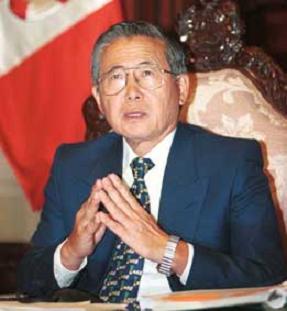
Main Page
Alphabetical Menu
The "F" Menu

Release Date: January 18th, 2006 (Film Forum) by Stardust Pictures. Directed by Ellen Perry. In English and Spanish with subtitles. BASIC PREMISE: A documentary about Alberto Fujimori, an international fugitive charged with kidnapping, murder, and corruption during his presidency in Peru between 1990 and 2000. ENTERTAINMENT VALUE: To uncover the real person behind what the media thinks about Fujimori, director Ellen Perry points the camera directly at him. Many innocent Peruvian civilians have been murdered while he was President of Peru. He’s also known for paying hefty amounts of money to the media to keep his good image. Throughout The Fall of Fujimori , his appearance seems surprisingly innocent for such a corrupt individual. In a way, Fujimori deserves a nomination for Best Actor—he dress nicely, remains calm, and makes sure to smile a lot even when he should be uncomfortable. During most of the interviews, you feel like you’re not watching the real Fujimori. He talks about his wife who ran for office without notifying him. The most crucial admission is that he never knew about the corrupt actions of Vladimiro Montesinos, his financial advisor, even when Montesinos paid different media executives shown in a video recorded by Fujimori’s own son. He goes on to say how his “third term” in office was technically a second term. While Perry clearly downplays Fujimori’s dark side, she implicitly and subtly shows his manipulative nature just by observing him. His manipulation and constant excuses eventually become boring, repetitive, and even predictable. Of course, he won't fully take the blame for being forced out of office by Peruvians shortly after his third term in 2000. Ultimately, Perry could have been much more provocative if she were to include interviews with other people who have met him to get a broader perspective about such a complex man. SPIRITUAL VALUE: The Fall of Fujimori ’s greatest weakness is that it fails to fully investigate and study who Fujimori really is. Listening to him go on and on using different excuses to make himself look better has its limitations. By merely observing Fujimori without analysis, writer/director Perry forces the burden of the work on the viewers to make their own interpretations to decode his excuses--most of which make him look good, of course. That just makes this documentary feel lazy and pointless. INSULT TO YOUR INTELLIGENCE: Too much observation of Fujimori without the proper analysis to paint a broader, more insightful picture of Fujimori. NUMBER OF TIMES I CHECKED MY WATCH: 2 IN A NUTSHELL: Fujimori knows how to give a good performance, so to speak, but, without external interpretation and analysis, writer/director Perry does not know how to make a truly insightful, compelling film about him. RECOMMENDED WAY TO WATCH: TV Main Page Alphabetical Menu The "F" Menu ______________________________________________________ |
The NYC Movie Guru
themovieguru101@yahoo.com
Privacy Policy